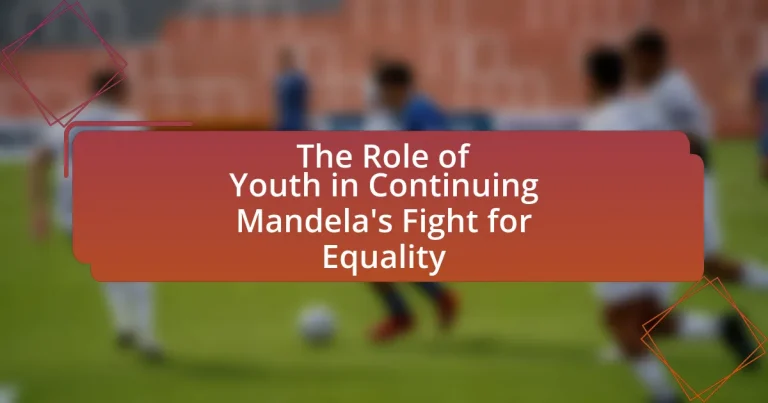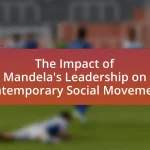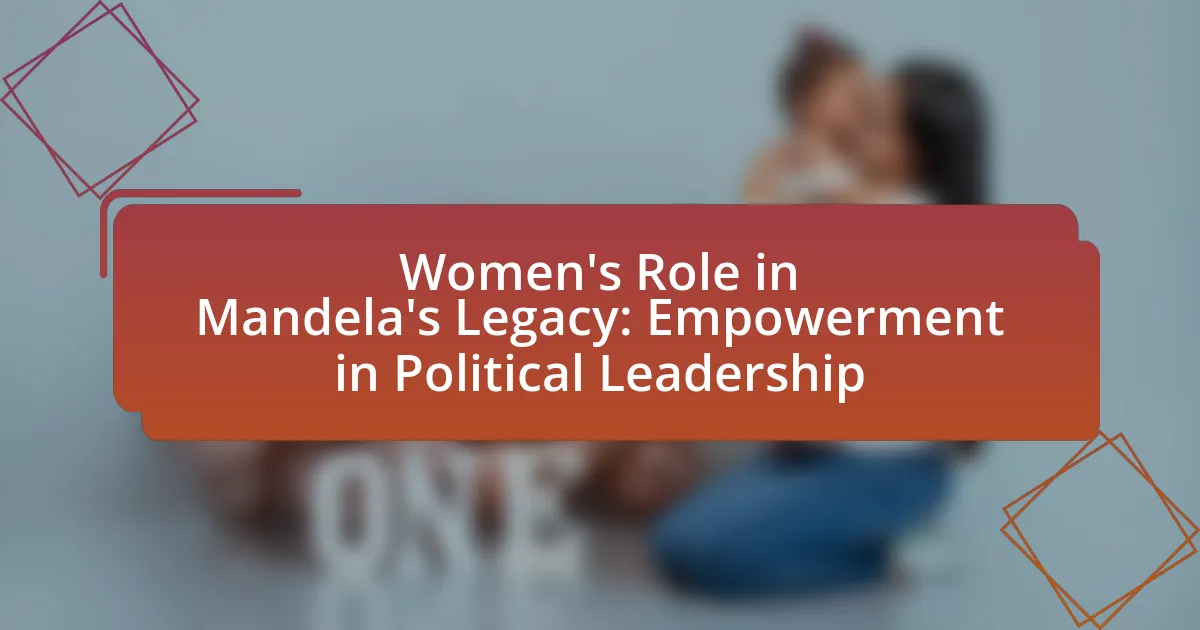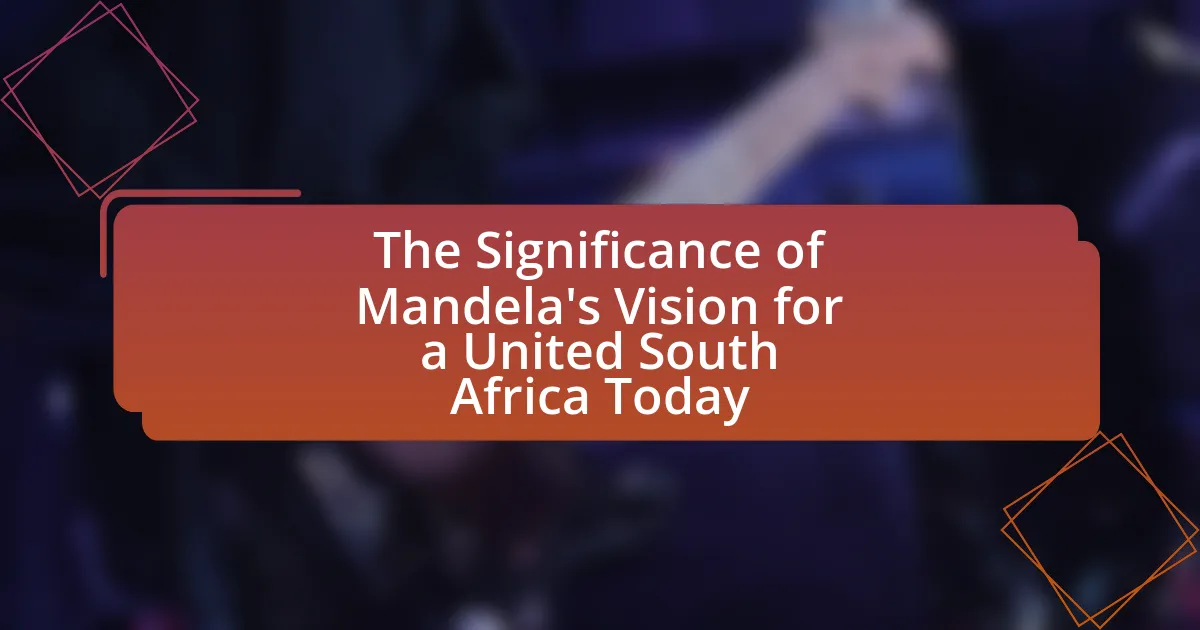The article examines the critical role of youth in perpetuating Nelson Mandela’s legacy of equality and social justice. It highlights how young people are at the forefront of contemporary movements, utilizing technology and social media to advocate for issues such as education affordability and racial justice. The piece discusses Mandela’s influence on youth activism, the challenges faced by young activists today, and the importance of education and community engagement in fostering effective activism. Additionally, it outlines strategies for youth to mobilize, collaborate with older generations, and access resources to support their initiatives for equality.
What is the Role of Youth in Continuing Mandela’s Fight for Equality?
The role of youth in continuing Mandela’s fight for equality is pivotal, as they embody the energy and innovation necessary for social change. Young people are often at the forefront of movements advocating for justice, leveraging technology and social media to raise awareness and mobilize support. For instance, the #FeesMustFall movement in South Africa, initiated by students in 2015, successfully challenged the government on issues of education affordability, reflecting Mandela’s legacy of activism for equal access to education. Furthermore, youth engagement in political processes, such as voting and advocacy, ensures that the principles of equality and human rights remain central to national discourse, thereby perpetuating Mandela’s vision for a fair society.
How did Nelson Mandela inspire youth in the fight for equality?
Nelson Mandela inspired youth in the fight for equality by embodying resilience and advocating for justice, which motivated young people to engage in activism. His leadership during the anti-apartheid movement demonstrated the power of collective action, as seen in the Soweto Uprising of 1976, where students protested against oppressive educational policies. Mandela’s emphasis on education as a tool for empowerment resonated with youth, encouraging them to pursue knowledge and challenge systemic injustices. His legacy is evident in the continued activism of young leaders who draw inspiration from his commitment to equality and human rights, reinforcing the idea that youth play a crucial role in social change.
What key messages did Mandela convey to the youth?
Nelson Mandela conveyed several key messages to the youth, emphasizing the importance of education, resilience, and active participation in societal change. He believed that education is the most powerful weapon to change the world, as stated in his famous quote, “Education is the great engine of personal development.” Mandela also encouraged young people to be resilient in the face of adversity, highlighting that challenges can be overcome through determination and unity. Furthermore, he urged the youth to engage in the fight for equality and justice, asserting that they have the power to shape the future and make a difference in their communities. These messages are rooted in his own experiences and struggles against apartheid, demonstrating the vital role of youth in promoting social justice and equality.
How did Mandela’s experiences shape his views on youth involvement?
Nelson Mandela’s experiences, particularly his imprisonment and involvement in the anti-apartheid movement, profoundly shaped his views on youth involvement. Mandela recognized that the youth were crucial in driving social change, as evidenced by their active participation in protests and movements, such as the 1976 Soweto Uprising, where young students protested against the imposition of Afrikaans in schools. This event highlighted the potential of youth to challenge oppressive systems and inspired Mandela to advocate for their engagement in the struggle for equality. He believed that empowering young people with education and leadership opportunities was essential for the continuation of the fight against injustice, as they represented hope for a more equitable future.
Why is youth involvement crucial in the fight for equality today?
Youth involvement is crucial in the fight for equality today because young people bring fresh perspectives, energy, and innovative approaches to social justice movements. Their engagement is evidenced by the global youth-led climate strikes, which have mobilized millions and highlighted the intersectionality of environmental issues and social justice. Additionally, studies show that youth activism has significantly influenced policy changes, such as the increased focus on racial equality and LGBTQ+ rights, demonstrating their capacity to drive societal transformation.
What unique perspectives do young people bring to social justice movements?
Young people bring fresh, innovative perspectives to social justice movements by leveraging technology and social media to amplify their voices and mobilize support. Their familiarity with digital platforms allows them to rapidly disseminate information, organize protests, and engage a global audience, as seen in movements like Black Lives Matter and climate activism. Additionally, young activists often challenge traditional narratives and advocate for intersectionality, recognizing the interconnectedness of various social issues, which broadens the scope of activism. Research from the Harvard Kennedy School highlights that youth-led movements are more likely to incorporate diverse viewpoints, making them more inclusive and representative of marginalized communities. This unique approach not only energizes the movements but also fosters a sense of urgency and adaptability in addressing contemporary social justice issues.
How can youth mobilize to address contemporary issues of inequality?
Youth can mobilize to address contemporary issues of inequality by organizing grassroots movements, leveraging social media for awareness, and engaging in community service initiatives. For instance, youth-led organizations like the Sunrise Movement have successfully advocated for climate justice, highlighting the intersection of environmental issues and social inequality. Additionally, studies show that social media campaigns can amplify voices and mobilize support, as seen in movements like Black Lives Matter, which gained traction through platforms like Twitter and Instagram. By participating in protests, lobbying for policy changes, and collaborating with established organizations, youth can effectively challenge systemic inequalities and promote social justice.
What challenges do youth face in continuing Mandela’s legacy?
Youth face significant challenges in continuing Mandela’s legacy, primarily due to socio-economic disparities, political apathy, and a lack of access to education. These factors hinder their ability to engage meaningfully in social justice initiatives. For instance, high unemployment rates among young people in South Africa, which stood at 63.3% for those aged 15-24 in 2021, limit their opportunities to advocate for equality and justice. Additionally, political disillusionment, evidenced by low voter turnout rates among youth, reflects a growing sense of apathy towards civic engagement. Furthermore, inadequate educational resources restrict their understanding of Mandela’s principles and the skills necessary for activism. These challenges collectively impede the youth’s capacity to uphold and advance Mandela’s vision for equality.
What societal barriers hinder youth participation in equality movements?
Societal barriers that hinder youth participation in equality movements include lack of access to education, socioeconomic disparities, and systemic discrimination. Limited educational opportunities restrict youth from understanding their rights and the importance of activism, as evidenced by UNESCO reports indicating that over 260 million children and youth are out of school globally. Socioeconomic disparities create financial constraints that prevent youth from engaging in movements, as many cannot afford to participate in protests or campaigns. Additionally, systemic discrimination based on race, gender, or sexual orientation can marginalize youth voices, making it difficult for them to be heard in equality movements. These barriers collectively diminish the potential impact of youth activism in the pursuit of equality.
How can young activists overcome these challenges?
Young activists can overcome challenges by leveraging digital platforms for organization and communication. These platforms enable them to mobilize support, share information rapidly, and connect with like-minded individuals globally. For instance, social media campaigns have proven effective in raising awareness and driving participation in movements, as seen in the global response to climate change led by youth activists like Greta Thunberg. Additionally, young activists can build coalitions with established organizations to gain resources and mentorship, enhancing their impact. Research indicates that collaborative efforts amplify advocacy effectiveness, as demonstrated by the success of youth-led initiatives in various social justice movements.
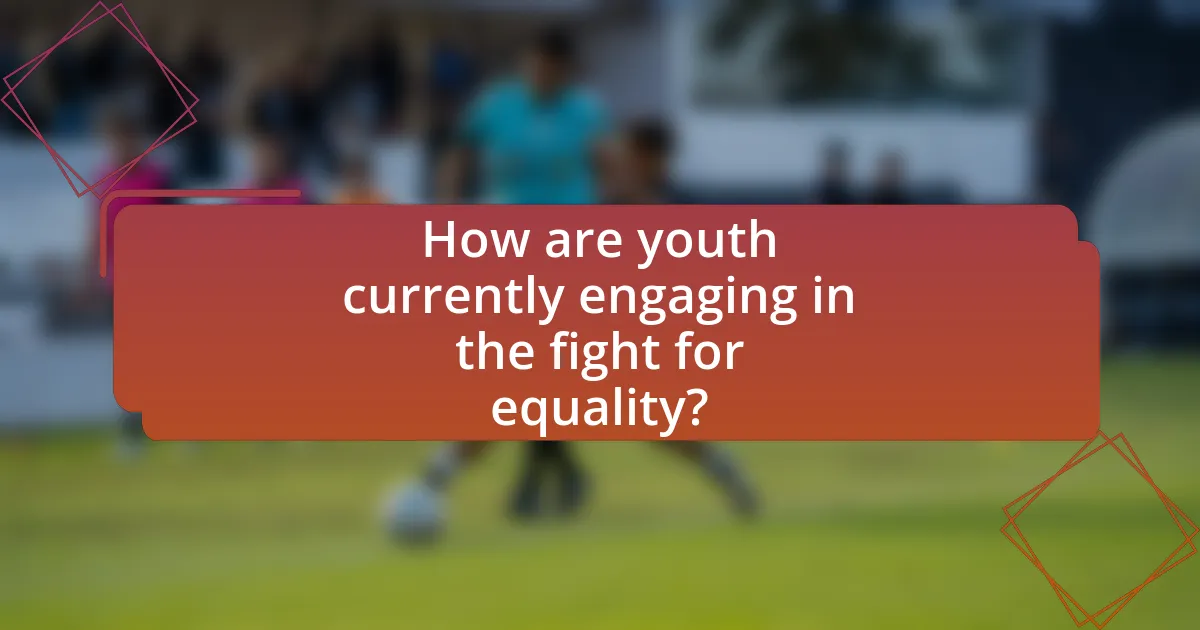
How are youth currently engaging in the fight for equality?
Youth are currently engaging in the fight for equality through activism, social media campaigns, and community organizing. Many young people participate in protests and movements advocating for racial, gender, and environmental justice, reflecting a commitment to social change. For instance, the Black Lives Matter movement has seen significant involvement from youth, with over 50% of participants being under 30 years old, according to a 2020 Pew Research Center study. Additionally, youth leverage platforms like Instagram and TikTok to raise awareness and mobilize support for various equality issues, demonstrating their ability to influence public discourse and policy.
What initiatives are led by youth to promote equality?
Youth-led initiatives to promote equality include movements such as the March for Our Lives, which advocates for gun control and safer schools, and the Fridays for Future climate strikes, emphasizing environmental justice. These initiatives are often organized by young activists who leverage social media to mobilize support and raise awareness about issues like racial equality, gender rights, and climate justice. For instance, the Black Lives Matter movement has seen significant youth involvement, with young leaders organizing protests and educational campaigns to address systemic racism. These efforts demonstrate the capacity of youth to influence public discourse and policy, reflecting a commitment to equality and social justice.
Which organizations are empowering youth in social justice efforts?
Organizations empowering youth in social justice efforts include the NAACP Youth & College Division, Youth Activism Project, and the United Nations Youth Envoy. The NAACP Youth & College Division focuses on civil rights advocacy and leadership development among young people, providing resources and training to engage in social justice initiatives. The Youth Activism Project promotes youth-led movements and provides tools for organizing and advocacy, emphasizing the importance of youth voices in social change. The United Nations Youth Envoy works to amplify youth perspectives in global discussions, ensuring that young people are included in decision-making processes related to social justice and equality. These organizations collectively contribute to empowering youth to take active roles in advocating for social justice.
How do social media platforms facilitate youth activism?
Social media platforms facilitate youth activism by providing accessible channels for communication, organization, and mobilization. These platforms enable young activists to share information rapidly, connect with like-minded individuals, and coordinate events or campaigns effectively. For instance, the use of hashtags on platforms like Twitter and Instagram has been instrumental in amplifying movements such as Black Lives Matter, allowing youth to raise awareness and engage a global audience. According to a study by the Pew Research Center, 72% of teens use social media, which underscores its significance as a tool for activism among youth. This widespread engagement allows for the rapid dissemination of ideas and fosters a sense of community, empowering young people to advocate for social change.
What role does education play in empowering youth for equality?
Education plays a crucial role in empowering youth for equality by equipping them with knowledge, critical thinking skills, and the ability to advocate for their rights. Through education, young individuals gain awareness of social injustices and learn about historical struggles for equality, such as those led by Nelson Mandela. Studies show that educated youth are more likely to engage in civic activities and challenge discriminatory practices, as evidenced by the Global Education Monitoring Report, which highlights that education fosters social cohesion and reduces inequalities. Thus, education serves as a foundational tool for youth to actively participate in the pursuit of equality and social justice.
How can educational institutions support youth activism?
Educational institutions can support youth activism by providing platforms for students to engage in social issues and facilitating access to resources that empower their initiatives. Schools and universities can create clubs or organizations focused on activism, allowing students to collaborate on projects that promote equality and social justice, similar to how Nelson Mandela inspired collective action for change. Additionally, institutions can offer workshops, guest lectures, and mentorship programs that educate students about civic engagement and the historical context of activism, reinforcing the importance of their role in societal transformation. Research indicates that when educational institutions actively promote civic engagement, students are more likely to participate in community service and advocacy efforts, thereby enhancing their leadership skills and commitment to social causes.
What programs exist to educate youth about equality and justice?
Programs that educate youth about equality and justice include the “Facing History and Ourselves” initiative, which provides resources and curricula focused on historical and contemporary issues of social justice. Another program is “The Equal Justice Initiative,” which offers educational materials aimed at raising awareness about systemic racism and the criminal justice system. Additionally, “Teach for America” incorporates lessons on equity and justice into its teaching framework, empowering educators to address these critical topics in classrooms. These programs are designed to foster understanding and advocacy among young people, equipping them with the knowledge to challenge inequality and promote justice in their communities.
How can youth collaborate with older generations in the fight for equality?
Youth can collaborate with older generations in the fight for equality by engaging in intergenerational dialogue and joint activism. This collaboration can take the form of mentorship programs where older activists share their experiences and strategies, while youth bring fresh perspectives and innovative approaches to social issues. For instance, initiatives like the “Youth and Elders Together” program have shown that when young people and older adults work together, they can effectively address systemic inequalities, as evidenced by successful campaigns for civil rights and social justice that have historically relied on the combined efforts of diverse age groups.
What strategies can bridge the gap between youth and experienced activists?
Mentorship programs can effectively bridge the gap between youth and experienced activists. These programs facilitate knowledge transfer, allowing seasoned activists to share their insights and strategies while empowering young activists to bring fresh perspectives and innovative approaches to social justice issues. Research indicates that mentorship fosters personal and professional growth, enhancing the skills and confidence of youth participants, which is crucial in movements for equality. For instance, a study by the National Mentoring Partnership found that mentored youth are 55% more likely to enroll in college and 78% more likely to volunteer regularly in their communities, demonstrating the positive impact of mentorship on civic engagement.
How can mentorship enhance youth involvement in social justice?
Mentorship can enhance youth involvement in social justice by providing guidance, resources, and a supportive network that empowers young individuals to take action. Mentors can share their experiences and knowledge about social justice issues, helping youth understand the complexities of these challenges and the importance of advocacy. Research indicates that youth who engage with mentors are more likely to participate in civic activities; for instance, a study by the National Mentoring Partnership found that mentored youth are 55% more likely to enroll in college and 78% more likely to volunteer regularly in their communities. This increased engagement fosters a sense of responsibility and equips young people with the skills necessary to effect change, thereby amplifying their impact in social justice movements.
What are the future prospects for youth in continuing Mandela’s fight for equality?
The future prospects for youth in continuing Mandela’s fight for equality are promising, as they possess the tools and platforms necessary to advocate for social justice. With access to technology and social media, young people can mobilize quickly, raise awareness, and engage in activism on a global scale. For instance, movements like Black Lives Matter and climate activism have shown how youth can effectively challenge systemic inequalities and influence policy changes. Furthermore, educational initiatives focused on human rights and social justice empower youth to understand and address issues of inequality, ensuring that Mandela’s legacy continues to inspire future generations.
How can youth sustain momentum in their activism?
Youth can sustain momentum in their activism by building strong networks and utilizing digital platforms for communication and organization. Engaging with like-minded individuals fosters collaboration and amplifies their message, while social media serves as a powerful tool to mobilize support and share information rapidly. Research indicates that movements led by youth, such as the climate strikes initiated by Greta Thunberg, have successfully maintained momentum through consistent online engagement and community-building efforts. This demonstrates that strategic use of technology and community connections are essential for sustaining activism over time.
What skills are essential for effective youth activism?
Effective youth activism requires strong communication skills, critical thinking, and leadership abilities. Communication skills enable youth activists to articulate their messages clearly and engage with diverse audiences, which is essential for mobilizing support. Critical thinking allows them to analyze social issues, develop informed opinions, and create effective strategies for change. Leadership abilities empower youth to inspire others, organize initiatives, and drive collective action. These skills are vital for addressing complex social challenges and fostering a culture of equality, reflecting the ongoing legacy of Nelson Mandela’s fight for justice.
How can youth measure the impact of their efforts on equality?
Youth can measure the impact of their efforts on equality through quantitative and qualitative assessments of social change initiatives. By tracking specific metrics such as the number of individuals reached, changes in community attitudes, or shifts in policy, youth can evaluate the effectiveness of their actions. For instance, surveys conducted before and after campaigns can provide data on changes in public perception regarding equality issues. Additionally, case studies documenting successful initiatives, like the youth-led movements for racial justice, demonstrate measurable outcomes such as increased voter registration or legislative changes. These methods provide concrete evidence of the impact youth efforts have on promoting equality.
What best practices can youth adopt to enhance their activism?
Youth can enhance their activism by engaging in informed advocacy, utilizing social media effectively, and collaborating with diverse groups. Informed advocacy involves researching issues thoroughly to understand the context and implications, which allows youth to articulate their positions clearly and persuasively. Effective use of social media platforms can amplify their messages, mobilize support, and connect with like-minded individuals globally; for instance, campaigns like #BlackLivesMatter have shown how social media can drive significant social change. Collaboration with diverse groups fosters inclusivity and broadens perspectives, enabling youth to build coalitions that strengthen their impact, as seen in movements like the March for Our Lives, which united students from various backgrounds to advocate for gun control.
How can young activists effectively communicate their message?
Young activists can effectively communicate their message by utilizing social media platforms to reach a broader audience and engage in dialogue. Social media allows for real-time interaction and the sharing of information, which is crucial for mobilizing support and raising awareness about social issues. For instance, campaigns like #BlackLivesMatter have demonstrated how young activists can leverage platforms like Twitter and Instagram to amplify their voices and connect with like-minded individuals globally. This method not only enhances visibility but also fosters community engagement, making it easier to organize events and initiatives that align with their message.
What role does community engagement play in successful activism?
Community engagement is crucial for successful activism as it fosters collective action and amplifies voices within a community. Engaged communities are more likely to mobilize resources, share information, and build networks that enhance the effectiveness of activism efforts. For instance, research by the Stanford Social Innovation Review highlights that grassroots movements, which rely heavily on community involvement, have historically achieved significant social change, such as the Civil Rights Movement, where local community organizing was essential for mobilizing support and resources. This demonstrates that community engagement not only strengthens the resolve of activists but also creates a more inclusive platform for diverse perspectives, ultimately leading to more impactful outcomes in the pursuit of equality.
What resources are available for youth to support their activism?
Youth can access various resources to support their activism, including online platforms, educational programs, and community organizations. Online platforms like social media enable youth to raise awareness and mobilize support for causes, while educational programs, such as workshops and webinars, provide training in advocacy and leadership skills. Community organizations often offer mentorship, funding opportunities, and networking events that connect young activists with experienced leaders in their fields. These resources empower youth to effectively engage in activism and contribute to social change, reflecting the ongoing legacy of leaders like Nelson Mandela in the fight for equality.
Which online platforms provide tools for youth activists?
Online platforms that provide tools for youth activists include Change.org, which allows users to create and sign petitions, and Facebook, which offers groups and event organizing features. Additionally, platforms like Twitter facilitate real-time communication and mobilization, while Instagram enables visual storytelling to raise awareness. These platforms are widely used by youth activists to amplify their voices and engage with broader audiences, as evidenced by numerous successful campaigns that have gained traction through social media channels.
How can youth access funding for their equality initiatives?
Youth can access funding for their equality initiatives through various channels such as grants, crowdfunding, and partnerships with established organizations. Many foundations and government programs specifically allocate funds for youth-led projects aimed at promoting equality, such as the United Nations Youth Fund, which supports initiatives that align with the Sustainable Development Goals. Additionally, platforms like GoFundMe and Kickstarter allow young activists to raise money directly from their communities. Research indicates that youth-led initiatives often receive support from local nonprofits and community organizations that recognize the importance of empowering young leaders in social justice movements.
